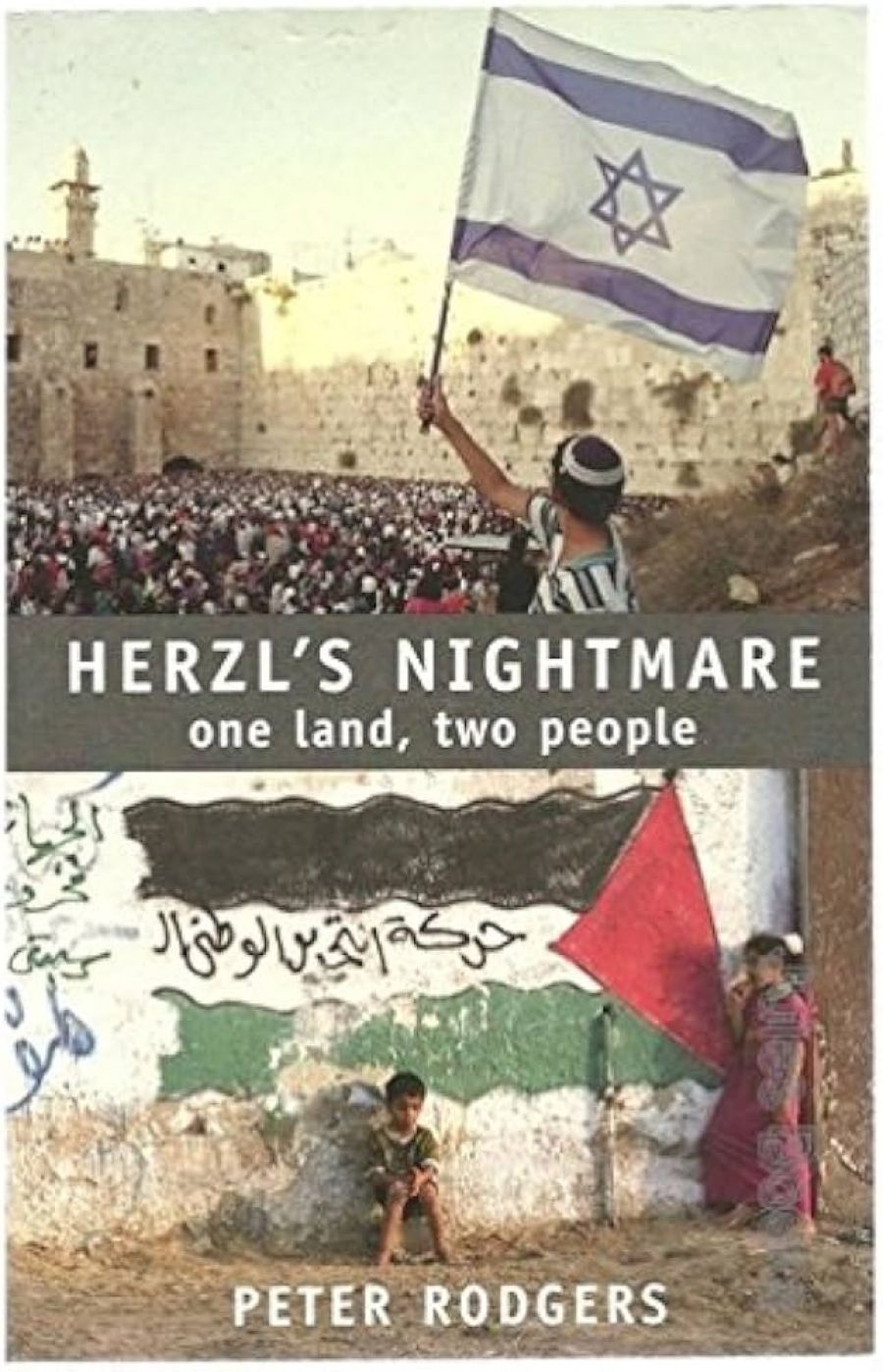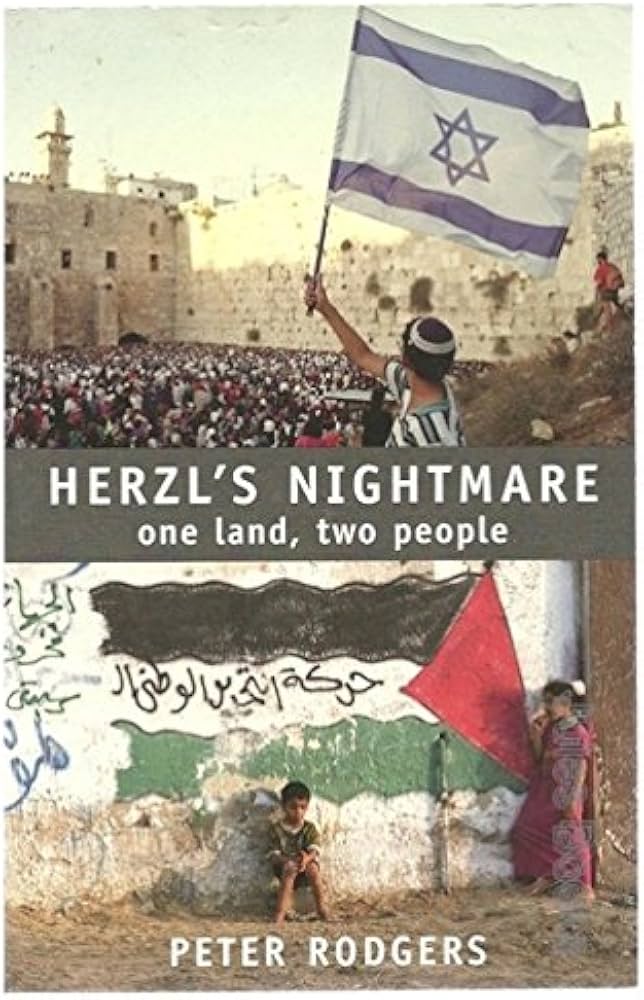
- Free Article: No
- Contents Category: Israel
- Review Article: Yes
- Article Title: A Flawed Tract
- Online Only: No
- Custom Highlight Text:
Peter Rodgers, Australia’s Ambassador to Israel from 1994-97, has produced a flimsy and flawed anti-Zionist tract that tells the reader much about his mindset but does not provide anything approaching a reliable historical or contemporary guide to Middle Eastern realities. Rodgers maintains a veneer of even-handedness, but his underlying point appears anything but balanced. Israel, apparently, was born in sin through dispossessing another people. Herzl’s ‘Zionist dream came at terrible cost to both the Jewish and Palestinian peoples’, according to Rodgers, who is now firmly rooted in the ideological terrain of those diplomats and journalists who believe that Israel deserves all the pain it is suffering. Herzl’s Nightmare is nothing more than a skewed anti-Israel diatribe that builds its case by means of a selective presentation of some facts.
- Book 1 Title: Herzl's Nightmare
- Book 1 Subtitle: One land, two people
- Book 1 Biblio: Scribe, $22pb, 122pp
- Book 1 Cover Small (400 x 600):

- Book 1 Cover (800 x 1200):

For example, Rodgers accuses Israel’s founder, David Ben Gurion, of planning the expulsion of Palestine’s Arab community well before Israel’s 1948 war of independence. To support his assertion, Rodgers adduces the following quotation from a letter Ben Gurion sent to his son: ‘We must expel the Arabs and take their places ... and if we have to use force ... we have force at our disposal.’ While quite long on accusation, Rodgers’s book is quite limited in terms of citations. But it is reasonably certain that this quotation originates from The Birth of the Palestine Refugee Question (1987), a book by Israeli ‘new historian’ Benny Morris that is quoted extensively by Rodgers. But Morris’s account of the Ben Gurion letter has been conclusively debunked by Professor Efraim Karsh of the University of London. In his book Fabricating Israeli History (2000). Professor Karsh demonstrates that the statement presented by Morris (using secondary sources), and adopted by Rodgers, is a 180-degree distortion. In fact, in context and with the missing sections restored, what Ben Gurion was actually saying was that, while the Jews might need to use force to defend themselves, there was no need to expel the Arab population.
One might initially be inclined to write this misrepresentation off as an innocent error, but it turns out that Karsh’s book features in the bibliography of Herzl’s Nightmare. In light of this, it is only reasonable to conclude that the author was either aware, or should have been aware, of the lively controversy surrounding Morris’s depiction of Ben Gurion as an avid ethnic-cleanser.
Rodgers’s historical overview is most egregious in his treatment of the last decade. The origins of the Oslo process (the Gulf War, collapse of the Soviet Union, the isolation of the Palestinians), its arrangements (Israel’s recognition of Palestinian claims to a homeland in return for mutual recognition and the Palestinian renunciation of violence and terrorism) and the reasons for the breakdown are given scant attention. To claim Rabin’s assassination as ‘marking the beginning of the end of Oslo’, when terrorism against Israeli citizens began eighteen months earlier in violation of the basis of the agreement and continued through the 1990s (including during Rodgers’s tenure in Israel), is blatantly to ignore the historical record.
Rodgers’s account of the Camp David talks is equally unsatisfactory. He expresses scepticism about the term of Barak’s ‘purportedly “generous” offer, said to involve Palestinian control of most of the West Bank and hared authority in key parts of East Jerusalem’ (what happened to Gaza?), accompanied by the claim that Arafat was not solely responsible for the collapse of Camp David. Yet the authoritative recent accounts of President Clinton (My Life, 2004) and mediator Dennis Ross (The Missing Peace, 2004) suggest that Arafat was overwhelmingly responsible for the summit’s failure. Moreover, Rodgers manages to avoid giving Barak any credit for offering to dismantle most Israeli settlements, despite the fact that to Rodgers they are, alternately, either equivalent to, or the major cause of, terrorism.
The final portion of Herzl’s Nightmare is devoted to speculation about Israel’s impending demise. Rodgers presents a litany of quotes that paint a gloomy tableau of the Jewish state’s future. But while his predominantly left-wing Israeli sources express despair, Rodgers, by contrast, seems to write with a sense of satisfaction. He clearly believes that Israel’s current tribulations are poetic justice for what he sees as the Jewish state’s past crimes.
Rodgers writes well. Yet not even the most mellifluous narrative can camouflage that the crux of the conflict resides in the obdurate Arab refusal to accept the right of a Jewish state to exist. Only one side (the Arabs) has repeatedly rejected compromise proposals that would allow for the national self-determination of Jews and Palestinians alike. Only one side has augmented this philosophical rejectionism with practical attempts to annihilate the other side by force.
Every page of this book is pervaded by a deep distaste for Zionism. To Rodgers, Israel is nothing more than a reincarnated crusader state, an alien European entity unjustly transplanted to a place where it doesn’t belong – the Arab Middle East. But Rodgers’s book is ultimately counterproductive, because Israelis will naturally reject this attack on their country. Any realistic resolution of the Middle Eastern conflict can only be based on a two-state solution that grants sovereignty to a Palestinian Arab nation and a Jewish nation that will live side by side. Only when the Arabs truly reconcile themselves to the right of a Jewish Israel to exist will a lasting peace in that region be able to prevail.


Comments powered by CComment